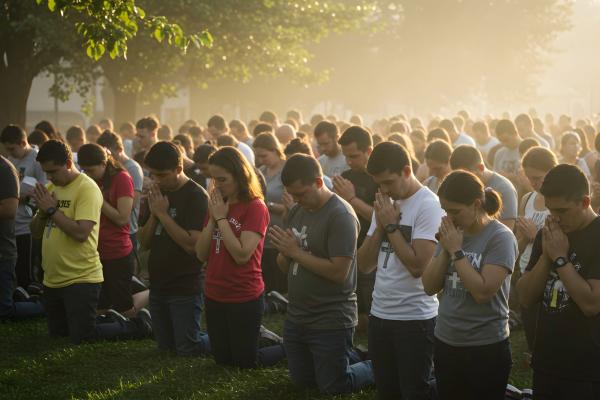 What is the Esther Fast? It was a grave matter to go before the king uninvited. If he didn’t extend his scepter to Queen Esther indicating his favor, she could be killed for such a brazen act. So Esther fasted and prayed. She called upon her handmaids and all of her fellow Jews under the foreign rule of King Ahasuerus to do the same. They fasted and prayed for three days before Esther approached the King to plead for the lives of her People. God used Esther to save the Jewish People from yet another attempt to annihilate them. Purim celebrates this great deliverance and is one of the most festive of all Jewish holidays. Before celebrating the victory, Jewish people follow Esther’s example with the “Esther Fast” from sunrise to sunset on the day before Purim.
What is the Esther Fast? It was a grave matter to go before the king uninvited. If he didn’t extend his scepter to Queen Esther indicating his favor, she could be killed for such a brazen act. So Esther fasted and prayed. She called upon her handmaids and all of her fellow Jews under the foreign rule of King Ahasuerus to do the same. They fasted and prayed for three days before Esther approached the King to plead for the lives of her People. God used Esther to save the Jewish People from yet another attempt to annihilate them. Purim celebrates this great deliverance and is one of the most festive of all Jewish holidays. Before celebrating the victory, Jewish people follow Esther’s example with the “Esther Fast” from sunrise to sunset on the day before Purim.
The details of fasting
A Jewish day
A Jewish day starts at sunset and ends 24 hours later. This can be a bit confusing to those of us whose calendars reflect days beginning at midnight. Because most of us are asleep when we leave one date behind and enter the next, in our mind, day precedes night. In the Jewish mind, however, night precedes day, and sunset begins a new date. So, in the case of Purim, “Purim night” comes before “Purim day,” and the one-day Jewish holiday straddles two of our Gregorian calendar days.
Esther Fast 2016
This year’s Esther Fast is from first light to nightfall on March 23 rd, with Purim beginning at sunset on the 23 rd and ending at sundown the 24 th.
Fasting
Typically, fasting is defined as abstaining from food, and sometimes drink, for a designated period of time. It’s how the morning meal got its name: we’re naturally fasting while we sleep, and when we awaken, we break our fast with breakfast. The sacrifice of fasting is a way to express our earnestness on a matter and is meant to increase our prayer for it. Every hunger pang reminds us of the purpose for the fast and drives us to the Lord with a fresh focus. Because some people have conditions that would make fasting unhealthy for them, you should consult your physician before fasting, or consider a fast of another kind.
Fasting from what and for how long?
For Believers in Yeshua, fasting can mean abstinence of different forms and durations. The idea is to abstain from something for the sake of prayer about a matter. A fast can be abstaining from food, drink, or an activity. You can sacrifice one meal, two meals, or give up eating for a whole day or more. When fasting from food, people often use the time they’d normally devote to preparing, eating, and cleaning up after the meal(s) for prayer instead.
Rather than whole meals, you can give up a certain item, such as sugar or special coffees. You can also fast from activities such as watching TV, browsing the Internet, using social media, or other forms of entertainment. The point is to give up something and replace it with a focus on the Lord and prayer.
Your fast can be of any duration. It could be fasting from one meal, giving up sugar for a month, abstaining from social media for a week, or sacrificing something else for another length of time.
Fasting for what?
For what kinds of things would someone fast? The answer is as vast as our prayers, including:
- An unbelieving family member
- A child gone astray
- An unhealthy habit that needs breaking
- Healing from sickness
- Recovery from a tragedy
- Wisdom for an important decision
- Favor in an area of need
These are all reasons one might fast before the Lord. At Jewish Voice Ministries, we invite participation in fasting before our outreaches, lifting up the myriad details, needs, and people we will serve.
For the Esther Fast
The original “Esther Fast” was to beseech the Lord not only for the king’s favor toward Esther when she went to see him without invitation, but more deeply it was for the protection of the Jewish People. Could there be a more appropriate fasting focus at Purim than the peace, protection, and safety of Israel? In Psalm 122:6, the Lord calls us to “pray for the peace of Jerusalem.”
Here are a few points you can take to the Lord on behalf of Israel:
- Since the autumn of 2015, Israel has endured almost daily terrorist attacks on individuals. Palestinian leaders praise the violent stabbings, shootings, and vehicular assaults on Israel’s population, proclaiming the assailants are martyrs and heroes.
- The media continues to influence opinions with misleading headlines that portray Palestinian attackers as victims and Israelis as perpetrators.
- Many in the world are fighting to delegitimize Israel as a nation, claiming they are “occupiers” of Palestinian land and blaming them for the oppressed conditions of Palestinian-ruled areas within Israel’s borders.
- Many colleges, companies, entertainers, and others continue to promote the international BDS Movement to Boycott, Divest from, and Sanction Israel for their perceived “occupation” and responses to Palestinian rocket fire and military engagement.
- As Israel is continually forced to respond to Palestinian aggression, the United Nations continues to reprimand Israel more than any other nation and only marginally find fault with Palestinian perpetrators.
If you choose to participate in an Esther Fast this Purim, we pray that your time with the Lord will be meaningful and that it will deepen your relationship with Him and draw you closer to His heart for His People, Israel.
What is Purim? To find out more about Purim, click here.
To learn more about Jewish Voice Ministries medical outreaches and how you can bring hope to hurting Jewish People around the world, click here.











